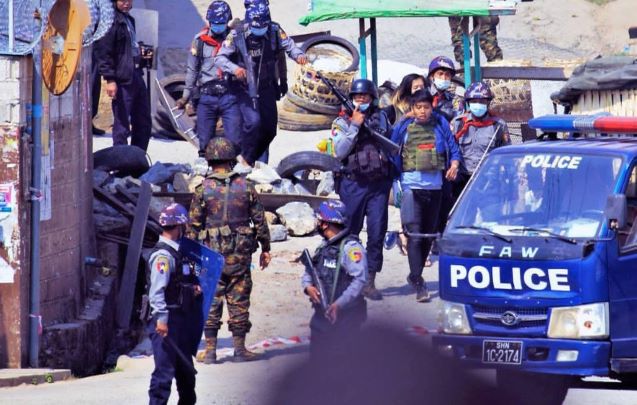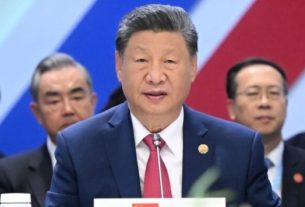BANGKOK — Chevron, PetroChina and other oil firms shipping jet fuel to Myanmar for civilian use may be inadvertently supplying an air force accused of widespread war crimes and should pause all deliveries to the country, rights group Amnesty International said in a report Thursday.
Deadly Cargo: Exposing the Supply Chain that Fuels War Crimes in Myanmar, examines eight shipments of Jet A-1 fuel – widely used in aviation – to the country since the February 2021 coup that toppled an elected government and set off a bloody conflict that has claimed thousands of lives.
Drawing on leaked company records, satellite data and interviews with military defectors, Amnesty paints a picture of “inextricably linked” civilian and military fuel supply chains inside Myanmar, making it impossible to guarantee that any jet fuel deliveries earmarked strictly for civilian use stay that way.
“Because the Myanmar military has such a hold and grip over a lot of the industry and the companies and agencies involved in the industry, the reality is that those two supply chains actually become one and there is a lot of overlap,” Montse Ferrer, the report’s lead author, told VOA.
Once any shipment of A-1 lands, “there’s too high of a risk of that fuel being thereafter misappropriated or used by the Myanmar military,” she added. “The consequence of that is that all companies should stop supplying.”
Death by air
The report comes in the wake of an October 23 air raid by the military that killed at least 50 people attending a concert in northern Myanmar organized by one of the many local rebel groups at war with the junta. It was the deadliest single air strike since the coup. The United Nations says a military bombing raid in Myanmar’s northwest the month before hit a school, killing 11 children.
The U.N.’s special rapporteur on human rights in Myanmar, Tom Andrews, has cited the military’s air strikes in several of his own reports accusing the junta of both war crimes and crimes against humanity.
The junta’s control of the skies means no one in Myanmar is safe, said Kyaw Win, executive director of the U.K.-based Burma Human Rights Network, which maintains a running record of the violence in Myanmar.
“They use helicopter gunships to kill so many,” he told VOA. “Just recently they used in Sagaing [region]; we have documented that. They used helicopter gunships and many people were killed in the village. And they used fighter jets in Karen State, and recently in Kachin State as well. So, it is very hard for the people in Burma; they are defenseless.”
Kyaw Win said the military is even picking up the pace of air strikes, possibly to compensate for dwindling ranks being depleted by casualties, desertions and recruiting shortfalls.
A spokesman for the junta could not be reached for comment. The military has said previously that it is using proportionate force against “terrorists” to restore order.
Amid the carnage, rights groups have started urging foreign companies and governments to starve the military of the fuel that keeps its planes, jets and helicopters flying. According to previous media reports citing energy data firms Kpler and Vortexa, Myanmar relies entirely on imports for its jet fuel, making for a possible chokepoint on the air force.
A tangled web
In researching its report, Amnesty found eight shipments of jet fuel to Myanmar since the coup and confirmed the suppliers of four of them: PetroChina’s wholly-owned Singapore Petroleum Company; Rosneft, of Russia; Chevron, of the United States; and Thai Oil.
All but PetroChina, which did not reply to Amnesty’s queries, confirmed the shipments to the rights group. In reply letters copied into the report, they say they were assured by their customers in Myanmar that the fuel would be put to commercial use only.
Amnesty lays out several reasons for why it says those assurances ring hollow.
It says all eight shipments landed at the Thilawa port in Yangon, the country’s commercial hub, which handles the vast majority of Myanmar’s military jet fuel deliveries as well. Once offloaded, it adds, all jet fuel is then stored in the same terminal at the port, and is delivered from there to both civilian airports and military air bases across the country by the same local cargo company, sometimes using the same trucks.
Where civilian and military jet fuel supplies mingle most, though, is at the civilian airports and their fuel depots, according to Amnesty. It says the military uses some of the same airports, down to their landing strips, and that satellite images show only one depot — run by a local company meant to be handling civilian supplies — at those sites. Amnesty says military defectors confirmed to the rights group that the air force would draw jet fuel from these airports for itself.
“So, it’s really especially in the storage of fuel at airports that there is an overlap between civilian and military,” said Ferrer.
The report also contains a copy of a letter from Myanmar’s Defense Ministry to the Myanmar Port Authority explaining that a December 2021 shipment of jet fuel from PetroChina is earmarked specifically for military aircraft. Amnesty says it saw another letter from another company, Asia Sun Trading, to the Customs Department in May explaining that it had bought jet fuel from Thai Oil also destined for the military.
Pulling out
Some of the companies have already announced plans to disengage from Myanmar or stop handling jet fuel.
That includes Puma Energy, a company majority owned by Singapore-based Trafigura that, according to Amnesty, imports, stores and distributes most of Myanmar’s jet fuel. It announced plans to exit the country early last month and told Amnesty that it had learned of reports of the military demanding jet fuel from airport facilities run by its joint venture in Myanmar, National Energy Puma Aviation Services, by force.
Also last month, Thai Oil told Amnesty it would be suspending jet fuel sales to Myanmar to avoid any doubts about its “good corporate governance” until those concern were allayed.
Chevron and Rosneft told Amnesty they were assured by the companies that bought their jet fuel that the shipments would be put to commercial use only.
Amnesty says PetroChina did not reply to its requests for comment at all. PetroChina did not reply to VOA either.
Amnesty says Pan Ocean, a South Korean firm that owns two of the ships that delivered jet fuel to Myanmar since the coup, also failed to reply to the group.
Responding to VOA, however, Pan Ocean said the company’s brokers and agents assured it that the shipments were not breaking any international sanctions. Even so, it added, “Pan Ocean has suspended aviation fuel shipments such as Jet [A-]1 to Myanmar since September this year, and this policy will be continued till the end of coup.”
Wilhelmsen, a Norwegian shipping agent that helps other companies manage their deliveries at the Thilawa port, told Amnesty that it too would stop servicing jet fuel shipments to Myanmar “until further notice.”__VOA News





